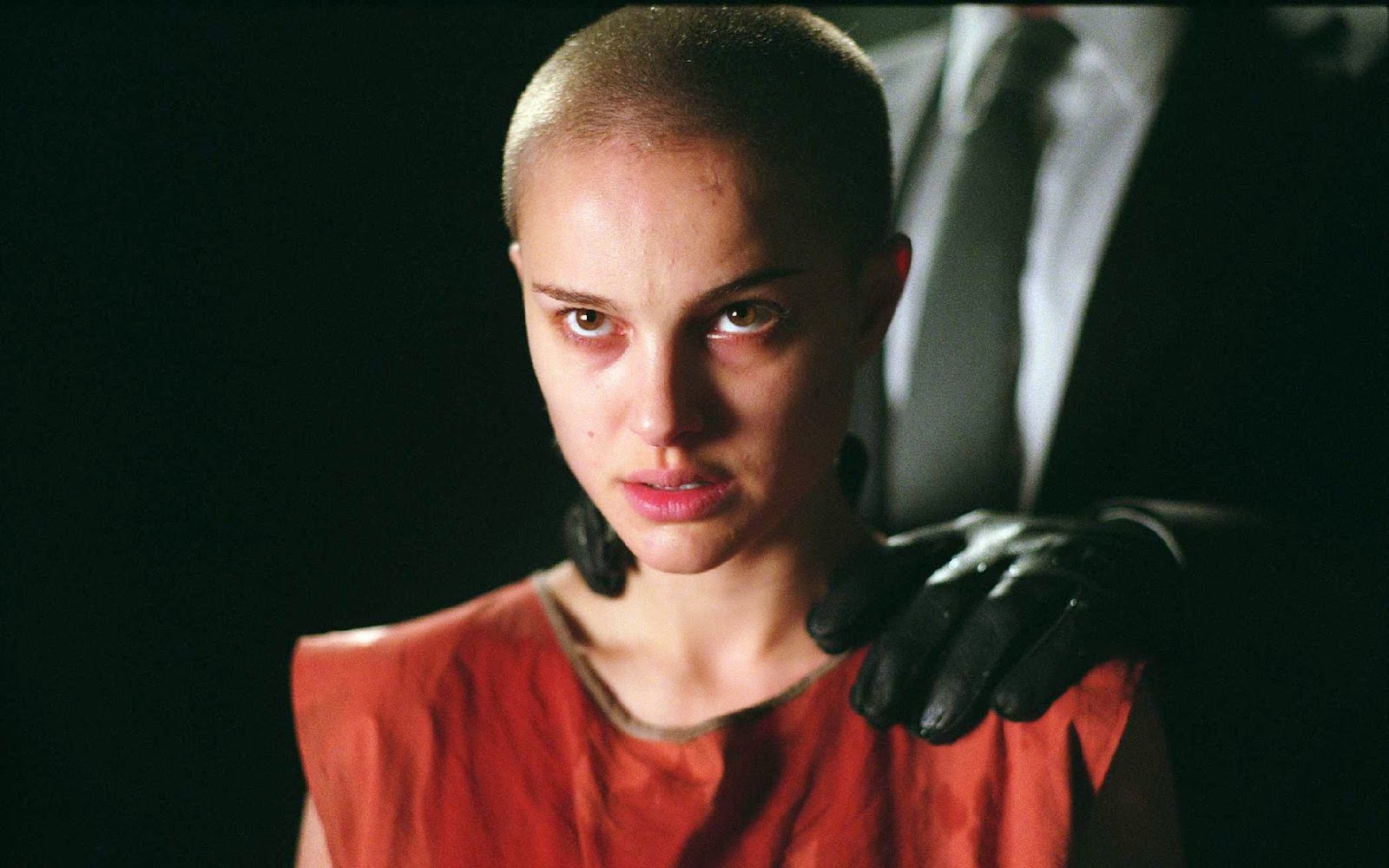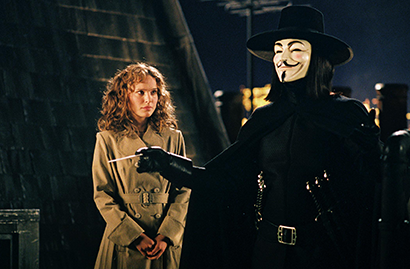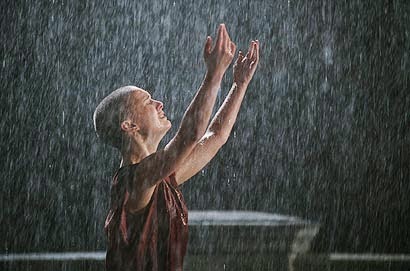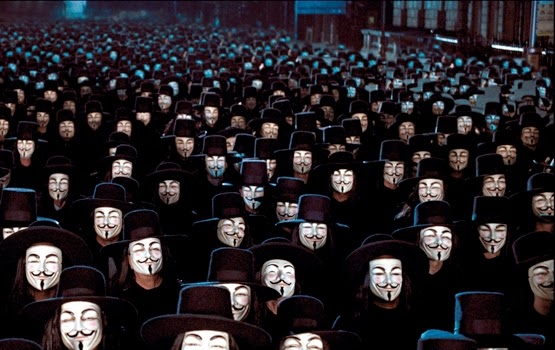I have never, to my knowledge, been a peaceable girl. I can remember being a small child - very small - and feeling anger as it prickled around my eyes and made my skin hot and tight with rage. I remember holding back tears of impotent fury in high school as my classmates laughed. I remember lashing out with words like knives, the feeling that my insides were too raw to do anything but bite.
I have always been angry.
But I have not always known what to do with my anger. Growing up, I read the New Testament, and I wondered what place and purpose there could possibly be for a girl like me. None of the women I could find were ever angry. And when Jesus was angry, Sunday School teachers liked to point out that it was all right, because Jesus' anger was automatically righteous. He was angry about the right things. I wanted to be angry like that, but I didn't know how. How to use this rage coiling around my heart, the kind of rage that made me choke on screams and made my fists like iron?
As I've gotten older, I haven't gotten any less angry. I have, however, learned how to be angry about the right things. And, thanks in good measure to our topic today, I have discovered the secret to using your anger for good. Simply put, my rage can only be beneficial when it is tempered by sadness. When my anger is purely for myself, it has no good purpose. But when it is for others, when I am filled with fury at the injustices of the world, then it can be used. It's all right to be angry that the world is full of suffering. The key is to know who to be angry with.
Eight years ago, as I was chewing through college, a little movie came out and I fell in love with it. That movie was, obviously, V for Vendetta, a film based on the graphic novel by Alan Moore and David Lloyd - a novel that I have not read and have no intention to.*
The film, which was written by the Wachowskis and directed by James McTeigue, is about an anarchist freedom fighter who struggled to destroy the government of a dystopian future England, while mentoring a young woman into following in his footsteps and teaching her about the values of freedom.
The movie is by no means perfect, either as an adaptation or as a work in its own right, and a lot of the ways that its philosophy has been applied in recent years are very problematic. It's become a touchstone for a number of internet-based governmental resistance movements, with everyone from Occupy to Anonymous claiming it as their own. And, for all that, it's incredibly hard to say what exactly the film is trying to say about tyranny or democracy or freedom.
As far as plot, the movie has a labyrinthine story that never becomes less complex and more plausible, but remains very entertaining for all that it makes no sense. Natalie Portman, who is the protagonist though not central character of the film, plays Evey Hammond, a low level employee at a news station just trying to get by in post-apocalyptic London.
As she makes her way across the city one night, she is stopped by a couple of "Fingermen" - secret police working for the ruling party - and threatened with rape. She is saved by a mysterious vigilante in a Guy Fawkes mask who whisks her away from danger and introduces himself as "V" (Hugo Weaving). No other name. He then proceeds to take Evey up to a rooftop and gives her a front row seat as he blows up the Old Bailey to the music of the 1812 Overture.
It's a dramatic start.
Evey's life, for all that she wishes it weren't, has been irrevocably changed by that night. While V does let her go in the morning, she then runs into him the next morning at work when he comes to take over the station for a special broadcast. Later, she escapes with him, and essentially becomes his prisoner, told that she will be allowed free in precisely one year.
Understandably not thrilled about that, especially when V has her help him murder corrupt officials, Evey tries to escape, only to be captured by the Fingermen, tortured horribly, and then released suddenly, only to find that it was V all along. He gives her the most exaggerated case of Stockholm Syndrome I've ever seen, and she learns that V himself was the result of the government's experimentation on "undesirable" people, an attempt to cleanse the nation that went horribly wrong. He's taking his revenge by trying to bring down the party that destroyed his life and killed millions of others.
It's a good movie. A violent, difficult, frenetic movie, but a good one. Throughout it all, the film seeks to understand what constitutes justice and freedom, and what circumstances make governmental control allowable. These are all important questions to ask.
And, on a personal level, while I can't stand the incredibly skeevy elements of Evey's story, where she's essentially brainwashed into loving V and respecting his cause, I do quite like the arc of a female character who goes from frightened and weak to strong and determined. Natalie Portman really does a great job.
But for me at least, the impact of this movie on my life had a lot less to do with the overarching plot or the implication of violence being necessary for the revolution of the state. My love for it isn't about V, or even Evey, as much as I like her. It's about the idea of this movie.
You see, I believe in trying to change the world. I have always believed in that. I believe that it is necessary and good to try to effect real change and make the world a better place for everyone. To stomp out injustice and prejudice and suffering. I also, however, believe that this is impossible. I believe that in this world, in this life, there will always be suffering and injustice, because there is real evil and it cannot be extinguished with education or understanding. I believe that this world will have to pass away before we can reach a place without pain.
I also believe that those two ideas do not contradict. I believe that we should strive to change the world, and I believe that it is impossible. I believe that the impossibility of this task is no excuse not to try.
I don't condone the violence perpetrated in V for Vendetta. For all that I've been a raging violent thing all my life, I believe strongly in pacifism (probably because I've always been a raging violent thing). I believe that we cannot solve our problems by destroying other humans. This movie, as much as it stirs my heart and makes me want to fight on and on, is about an anarchist terrorist murdering people and remaking the state in his own image. And I'm not really okay with that.
But I also watch this movie and I see so much hope. This movie is about V, sure, but it's also about Evey waking up and deciding to change the world too. It's about the mass of people marching on Parliament on the fifth of November, a mass of people who believe that something is wrong with their country, and that as citizens in it, they have a responsibility to be part of the change. I love this movie because it's about fighting, even if you have no idea you will succeed.
Someone - I wish I knew who - had an explanation of the two types of anger that I have loved. The first is dry anger, where you are offended on your own behalf, where you lash out and feel like you're shooting fire. And then there's wet anger, where you just want to sob tears of frustration because they don't understand how important this is, how wrong they are.
I get wet anger when I think about all of the suffering in the world. How can it be happening still? How can people still be so blind to the injustice in the world? How can they not care? Worse still, how can they perpetuate it? How can they make it happen? How?
The thing is, V for Vendetta taught me something very important, though I don't think it's what it was trying to teach. Because for all that it's easy to rage against human beings who do terrible things, we also need to remember that they are still human. And that the terrible things they have done do not mean we should not fight to save them. It means we should fight harder.
I don't think the world can be saved, not in this life, not by people. Because people are inherently wrong. We're petty and cheap and corrupt and selfish and afraid. I am all of those things. I don't think I will succeed in changing the world, not on my own. But that is no excuse no to try. Just because I am horrified by the things that have been done in the world does not mean I should not try to save the people who have done them. Save the victims, yes. But also save the criminals. Save everyone. Love everyone.
I'm not saying this is easy, or that it is something I have mastered. I haven't. At all. I still sometimes wake up feeling so much rage, white and hot and dry, that I want to lash out and bite until I can feel my opponents ripping apart. I feel like I will shake apart with how much evil is in the world, and that the only thing I can do is fight. But I know that there's fighting, and there's fighting. There's rage, and then there's rage. I will choose to fight to save you, not to destroy you. To rage on your behalf, and to never forget who the real enemy is.
Perhaps the most heartbreaking part of V for Vendetta is how plausible it all is. It paints a picture of a world torn apart by suffering and human actions, and it's a world we can all imagine. It's so close, so easy to see. It's even easier to believe that this world is already here. But believing that, believing that we have to destroy something in order to create a new world, will not solve anything. Nor will anger that is aimless and targeted at our fellow man. Be angry, yes. But be angry because of injustice, and be angry on behalf of others.
Keep fighting. Not against people, but against evil and suffering and corruption. Do not forget the humanity of the people around you. Because as cool as the explosions and music and fireworks at the end of the movie are, the real part that moves me is the part where the camera turns and shows a crowd of people coming together to make a world new. Not to destroy the old, but to choose redemption and a new start.
That's what I will be angry for.
*I tried. I got five pages in, realized I didn't care, and then stopped.







I feel the same. There's anger, so much so that I want to storm into the houses of governance, force everyone in there to sit on their hands, and scream at them, possibly using the book of Amos or Jeremiah as a touchstone script (nobody embodies my frustration at society like those guys) until they just STOP! STOP IT! But then underneath it all I find that I'm usually just profoundly sad and world-weary, and there's no cure for it.
ReplyDeleteAnd yet somehow, after shutting myself away for a few days I decide to get up, and I go and interact with people again, and I keep trying to not to be cruel to people. What else is there to do? Sometimes it's helplessness, and sometimes it's with a fighters spirit.
I find myself with a strong urge to thwack people with the book of Luke. I find comfort in reading the prophets and reminding myself that they were usually pretty pissed off too.
DeleteAs we are nearing "Passing Awareness", we turn out to be more fragile, delicate and savvy as our soul being plans to desert the physical bodyhttp://flowersforfunerals.nation2.com/
ReplyDeleteKOLKATA ESCORTS
ReplyDeleteKOLKATA ESCORT
KOLKATA ESCORT SERVICE
KOLKATA INDEPENDENT ESCORTS
KOLKATA INDEPENDENT ESCORT
ESCORT IN KOLKATA
ESCORTS IN KOLKATA
VILLAGE CALL GIRLS
VILLAGE CALL GIRL
CALL GIRL
CALL GIRLS
ESCORT
ESCORTS
KOLKATA FEMALE ESCORTS
KOLKATA HOTEL ESCORTS
KOLKATA MODEL ESCORTS
KOLKATA CALL GIRL
KOLKATA CALL GIRL SERVICE
KOLKATA CALL GIRL SERVICE
KOLKATA CALL GIRLS
CALL GIRL
CALL GIRLS
CALL GIRLS SERVICE
CALL GIRL SERVICE
KOLKATA INDEPENDENT CALL GIRLS
KOLKATA INDEPENDENT CALL GIRL
ESCORT
KOLKATA ESCORTS
KOLKATA ESCORT